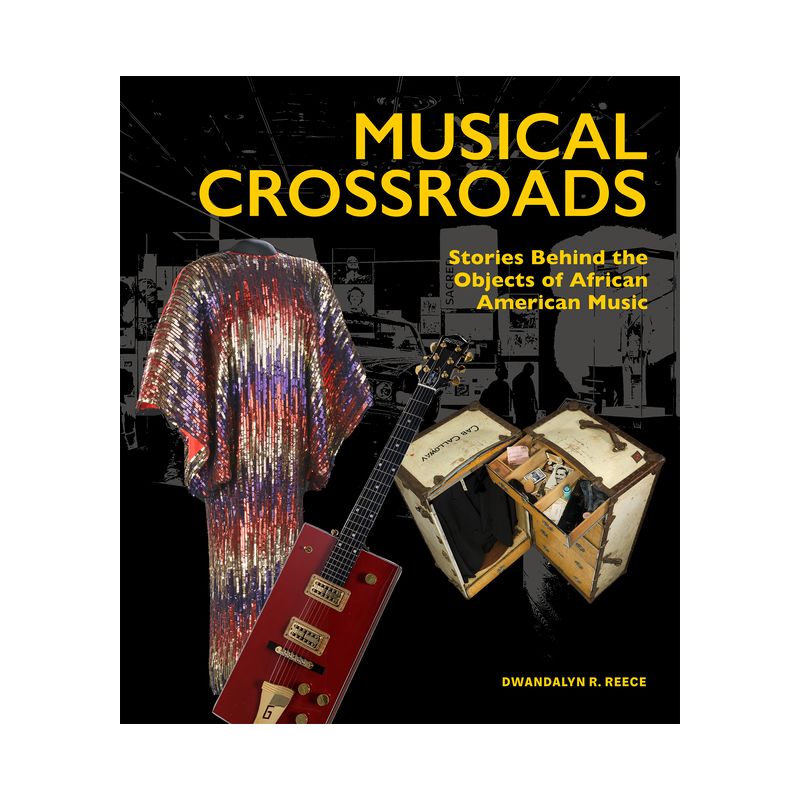Sponsored
Sponsored
About this item
Highlights
- This major new title builds out of Musical Crossroads, one of the 12 permanent exhibitions at the National Museum of African American History and Culture, to present a vibrantly illustrated exploration of 400 years of African American musical culture.Music is the great equalizer around the world.
- About the Author: Dwandalyn R. Reece PhD is associate director for curatorial affairs and the former curator of music and performing arts at the Smithsonian National Museum of African American History and Culture, where she curated the museum's permanent exhibition, Musical Crossroads for which she received the Secretary's Research Prize in 2017.
- 224 Pages
- History, African American
Description
Book Synopsis
This major new title builds out of Musical Crossroads, one of the 12 permanent exhibitions at the National Museum of African American History and Culture, to present a vibrantly illustrated exploration of 400 years of African American musical culture.
Music is the great equalizer around the world. No matter where it originates or what form it takes, it has had a profound role in shaping the human experience and preserving the history of that experience for centuries. African American music originated out of a heritage shaped by the Transatlantic Slave Trade and forced enslavement. The music born out of this shared identity was a means of survival, a treatise on the struggle for freedom, and an agent of social change, and generated a vast array of musical styles and performance traditions that have defined American music. Musical Crossroads explores how objects can expand our understanding of the ways African American music-making continues to shape and influence society.
Five thematic chapters are introduced with an essay by Dwandalyn R. Reece, and accompanied by shorter features written by museum staff. Striking images include Johnny Mathis on stage; Bo Diddley's Gretsch Guitar; Nina Simone recording "Don't Let Me Be Misunderstood" to name just a few. Featured objects include Radio Raheem's original boombox used in Spike Lee's 1989 film, Do the Right Thing; the original Public Enemy logo necklace alongside a story from rapper Chuck D about where the group's name comes from; and photos of Queen Latifah taken by Hip-hop photographer Al Pereira while she was filming the music video for "Fly Girl". Numerous illustrated profiles and stories relating to a host of DJs, producers, Black-owned record labels, Black music press, and artists, include magazines like Defender, Blacks Stars, and Vibe; record labels like Vee-Jay, Stax, Motown and Sussex Records; promoters and producers including Berry Gordy Jr, Isaac Hayes, and Ernie Freeman; as well as artists Otis Redding, Nina Simone, Luther Vandross, Little Richard, Bill Withers, Billie Holiday, Whitney Houston, and Janet Jackson, to name a few - they're all here.
Review Quotes
"A bravely, deeply researched, rich and relevant book, it addresses the critical crossroads of ritual, creativity, object art and its cultural value and meaning"--Dr. William( Bill) Banfield, Professor Emeritus founding director of Black Music Culture Studies, Berklee College of Music
"Black music has been going on forever: longer than me, longer than you, longer than most people know. But some people
know. This book, managed by a museum and powered by love, looks at African American music over the centuries and through the people, instruments, and objects that made it happen. There is no future without the past."-- Ahmir "Questlove" Thompson, Academy Award-winning filmmaker, drummer, DJ, producer, New York Times best-selling author, and member of The Roots
"Musical Crossroads models for both scholar and novice how instruments, photographs, clothing, and other forms of ephemera offer insights that affirm, but also have the potential to challenge and expand our understanding of Black musicking in America. This book is essential reading for anyone interested in the history of African American music, its relationship to the formation of American identity and its larger impact on global communities.--Tammy L. Kernodle, University Distinguished Professor of Music, Miami University (Ohio), Immediate Past President, Society for American Music
About the Author
Dwandalyn R. Reece PhD is associate director for curatorial affairs and the former curator of music and performing arts at the Smithsonian National Museum of African American History and Culture, where she curated the museum's permanent exhibition, Musical Crossroads for which she received the Secretary's Research Prize in 2017.Foreword by Kevin Young, Andrew W. Mellon Director of the National Museum of African American History and Culture.Profiles and stories by historians and specialists at the National Museum of African American History and Culture: Timothy Anne Burnside, Hannah Grantham, Tuliza Fleming, Steven W. Lewis, Vanessa L.
Moorer, Kelly Elaine Navies, Dwandalyn R. Reece, Douglas T. Remley, Deborah Tulani Salahu-Din, Kevin M. Strait, Angela Tate, and Eric Lewis Williams.
Additional product information and recommendations
Sponsored
